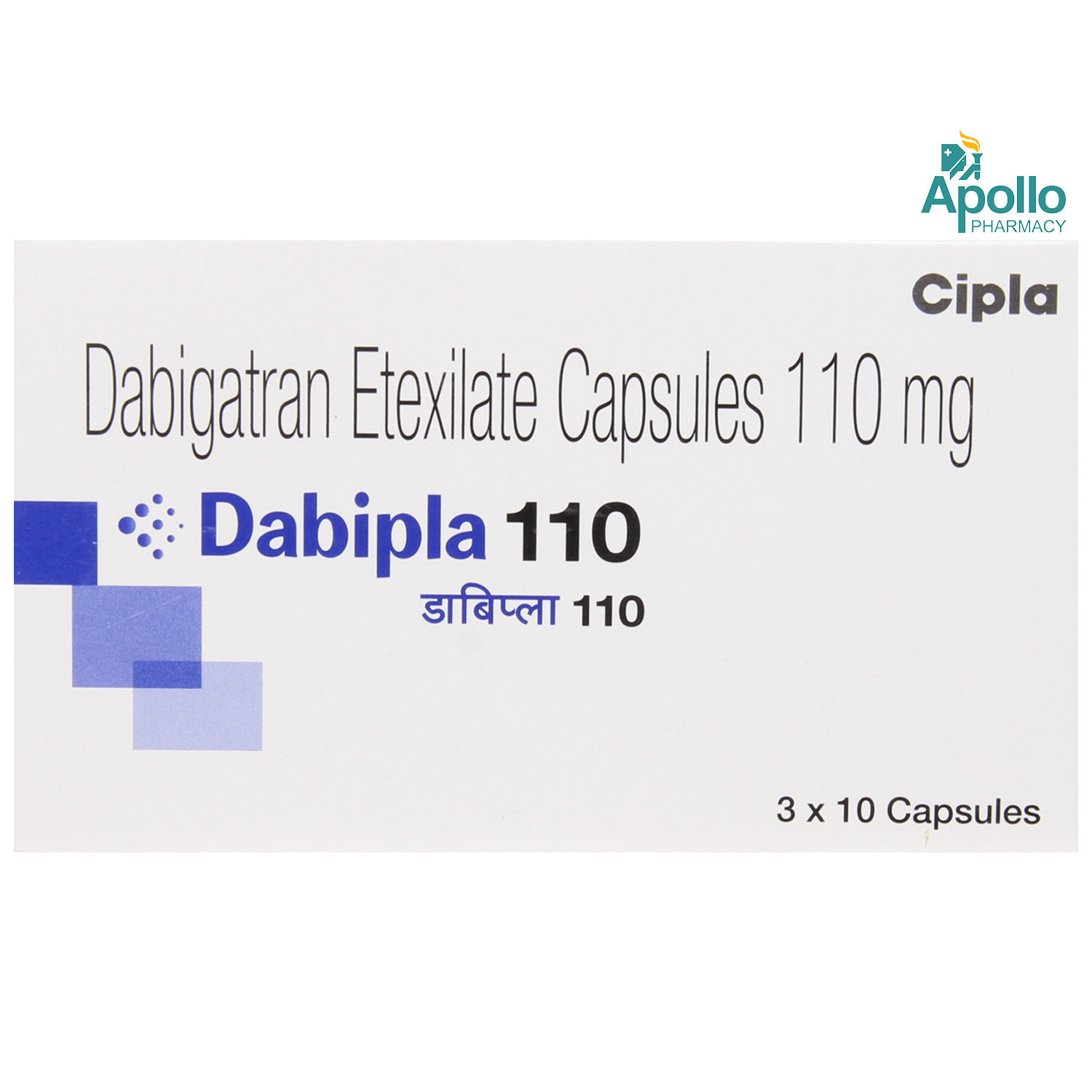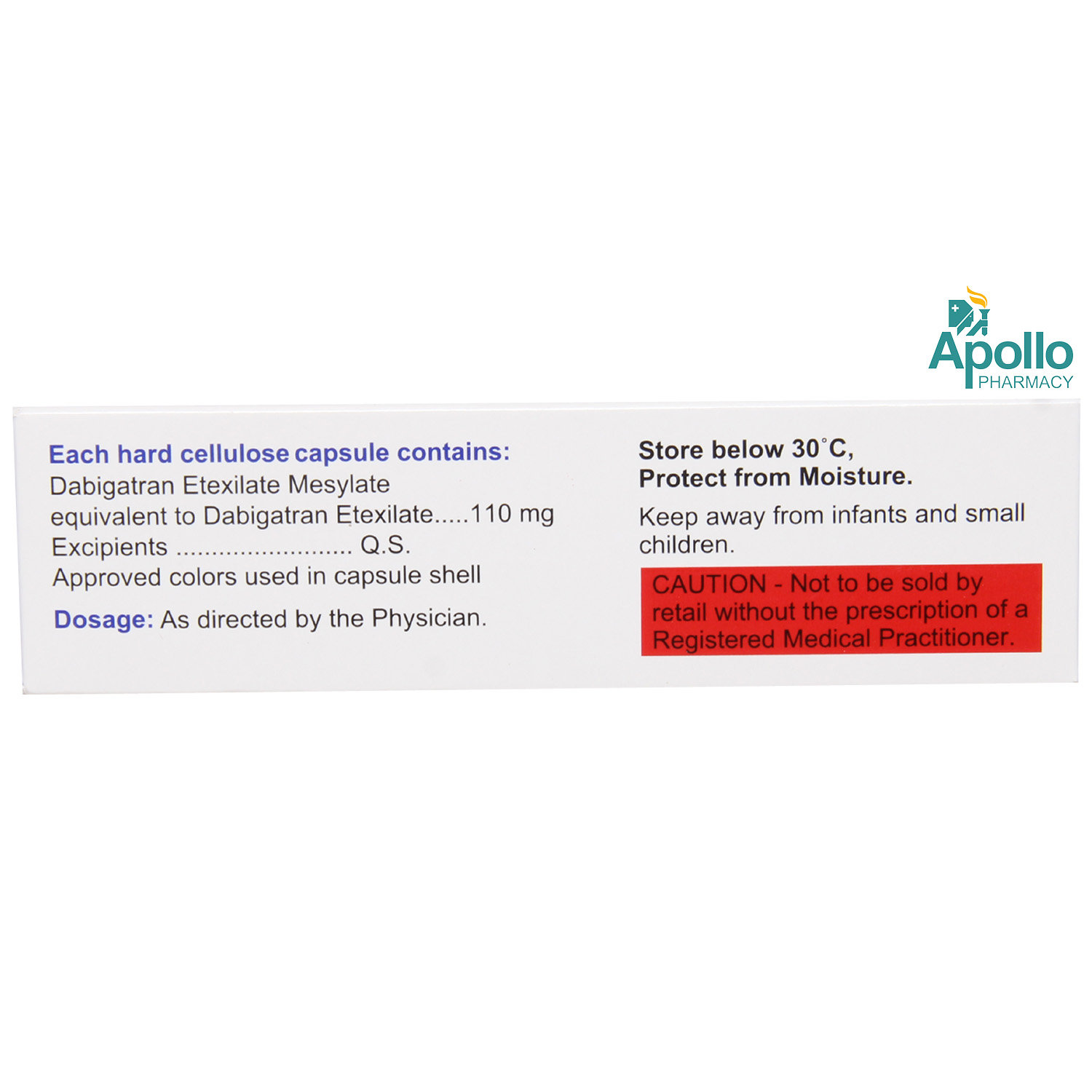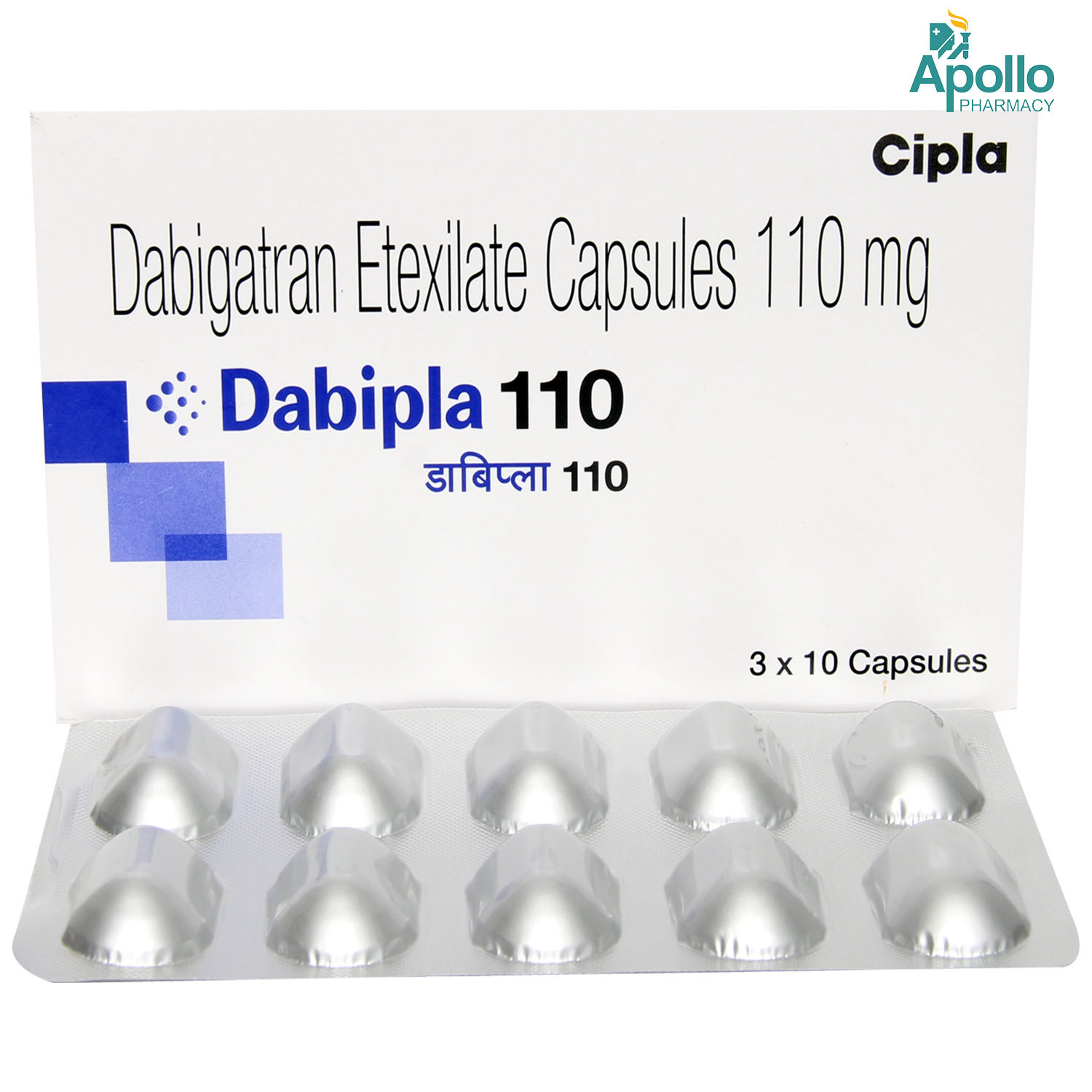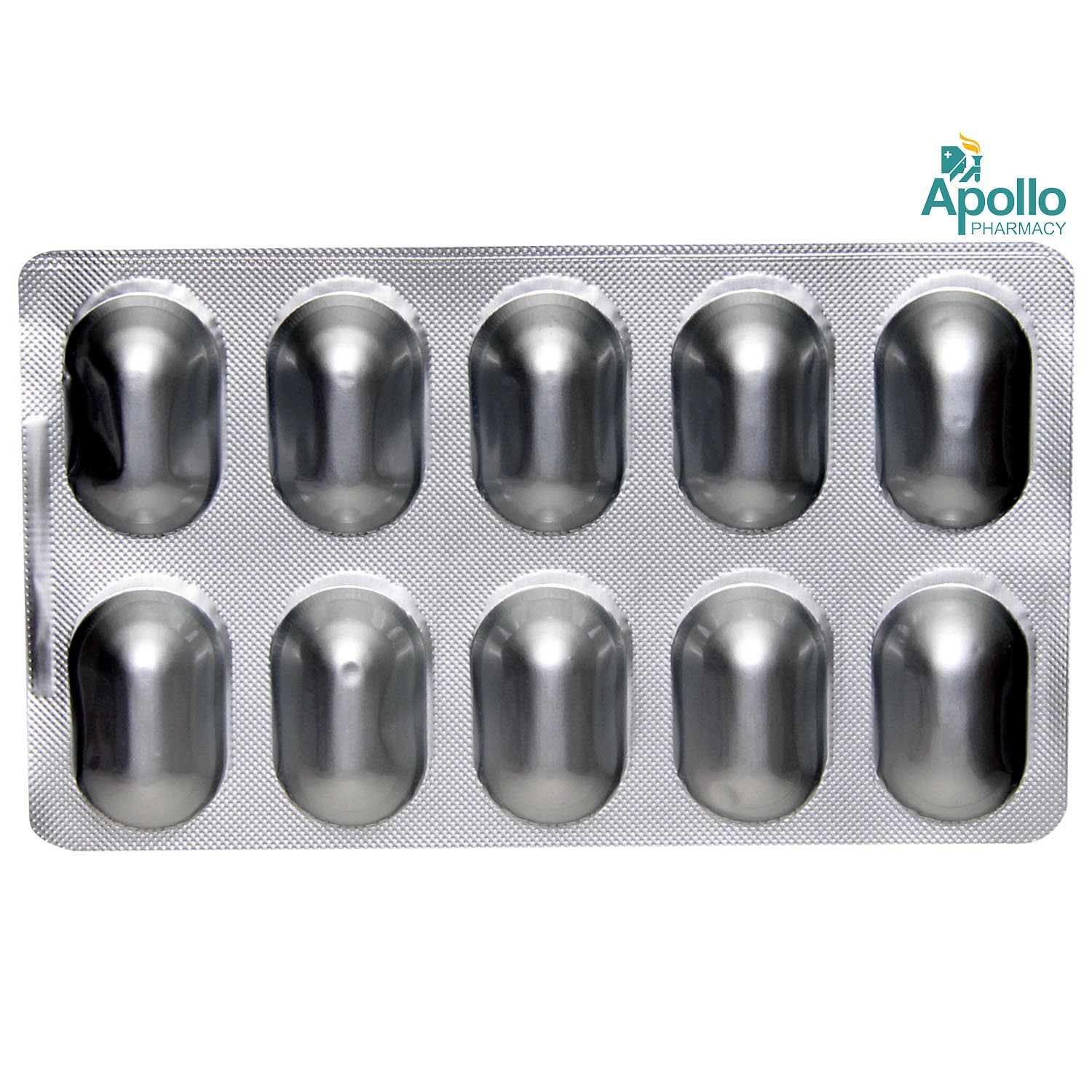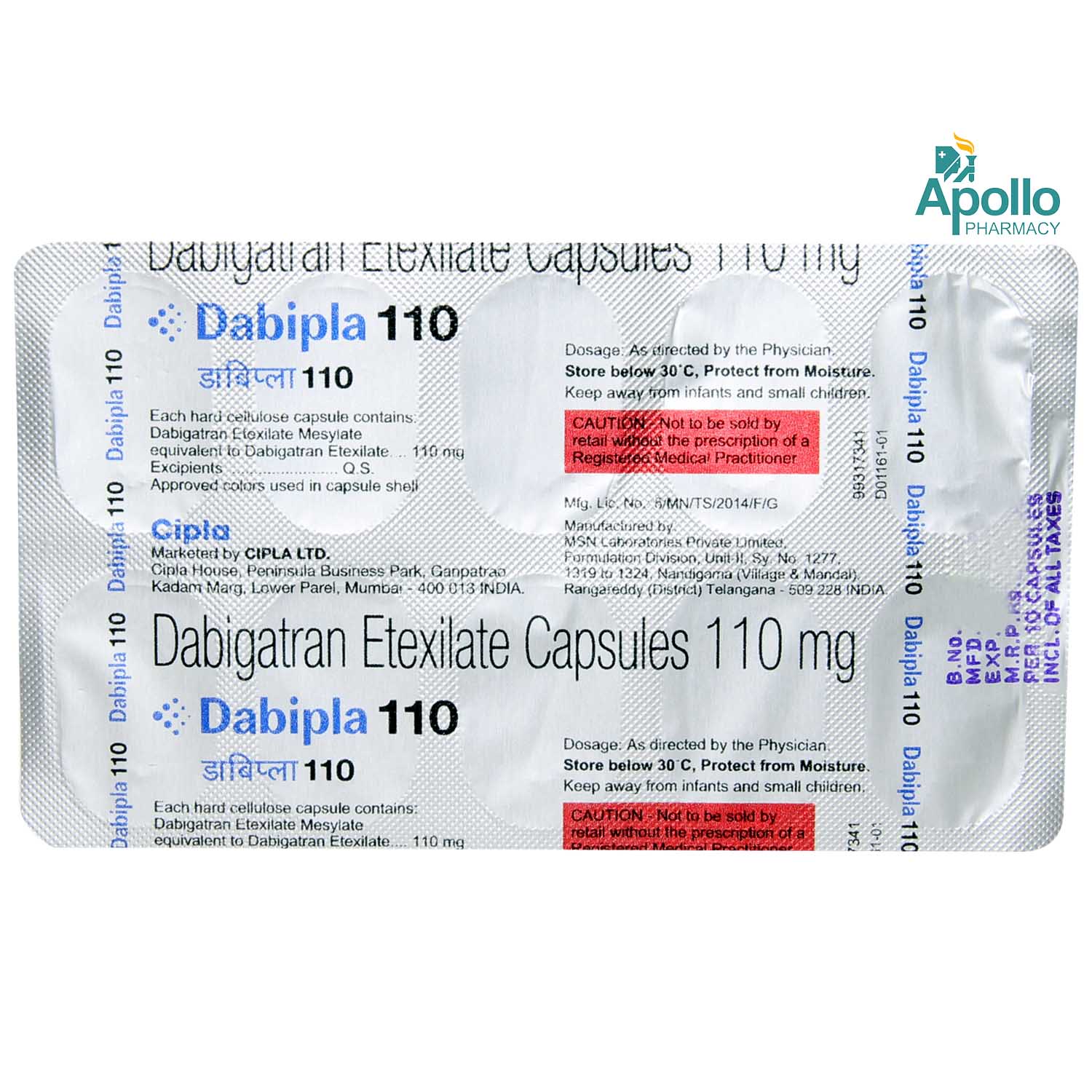Dabipla 110 Capsule 10's
MRP ₹290
(Inclusive of all Taxes)
₹43.5 Cashback (15%)
Provide Delivery Location
Online payment accepted
 Prescription drug
Prescription drugWhats That
Composition :
Manufacturer/Marketer :
Consume Type :
Expires on or after :
Return Policy :
About Dabipla 110 Capsule
Dabipla 110 Capsule belongs to a class of drugs known as anticoagulants or blood thinners. Dabipla 110 Capsule is primarily used to prevent stroke (blood clots in the brain). It is also used to prevent and treat deep vein thrombosis (blood clots in leg veins), and pulmonary embolism (blood clots in the lung) by reducing blood clot formation. Deep vein thrombosis is a medical condition in which blood clots form in deep veins, usually in the legs. Pulmonary embolism is a condition in which a blood clot blocks the arteries in the lungs.
Dabipla 110 Capsule contains Dabigatran etexilate mesylate, which is a new oral blood thinner. It works by blocking a substance (a protein known as thrombin) in the blood and prevents blood clot formation. Therefore, Dabipla 110 Capsule preventing blood clot formation in the body.
Take Dabipla 110 Capsule as prescribed by your doctor. You are advised to take Dabipla 110 Capsule for as long as your doctor has prescribed it for you, depending on your medical conditions. You may experience bleeding, stomach pain, nausea, and indigestion. Most of these side effects of Dabipla 110 Capsule do not require medical attention and gradually resolve over time. However, if the side effects persist or worsen, please consult your doctor.
If you are known to be allergic to Dabipla 110 Capsule or any other medicines, please tell your doctor. Dabipla 110 Capsule should not be taken in the conditions like bleeding disorder, or kidney disease. If you are pregnant or a nursing mother, it is advised to consult a doctor before using Dabipla 110 Capsule . Dabipla 110 Capsule should not be used for children below 18 years of age. Dabipla 110 Capsule has no known effects on the ability to drive and use machines. It is advisable for you to avoid alcohol consumption with Dabipla 110 Capsule as it may increase the risk of bleeding.
Uses of Dabipla 110 Capsule
Directions for Use
Key Benefits
Dabipla 110 Capsule belongs to a class of drugs known as anticoagulants or blood thinners. Dabipla 110 Capsule is primarily used to prevent stroke (blood clots in the brain). It is also used to prevent blood clots in the heart and prevent heart attacks. Besides this Dabipla 110 Capsule is also used to prevent and treat deep vein thrombosis (blood clots in leg veins), and pulmonary embolism (blood clots in the lung) by reducing blood clot formation. This Dabipla 110 Capsule may also be used to prevent the formation of blood clots after hip replacement surgery. It works by blocking a substance (a protein known as thrombin) in the blood and prevents blood clot formation. Therefore, Dabipla 110 Capsule prevents blood clot formation in the body.
Storage
- Take medications with food (if recommended): It can help prevent stomach distress and indigestion.
- Eat smaller, more frequent meals: Divide daily food intake into smaller, more frequent meals to ease digestion.
- Avoid trigger foods: Identify and avoid foods that trigger indigestion, such as spicy, fatty, or acidic foods.
- Stay upright after eating: Sit or stand upright for at least 1-2 hours after eating to prevent stomach acid from flowing into the oesophagus.
- Avoid carbonated drinks: Avoid drinking carbonated beverages, such as soda or beer, which can worsen indigestion.
- Manage stress: To alleviate indigestion, engage in stress-reducing activities like deep breathing exercises or meditation.
- Consult a doctor if needed: If indigestion worsens or persists, consult a healthcare professional to adjust the medication regimen or explore alternative treatments.
- Drink water or other clear fluids.
- To prevent worsening of pain, limit intake of tea, coffee, or alcohol.
- Include bland foods like rice, toast, crackers, and rice in your diet.
- Avoid lying down immediately after eating as it may cause indigestion or heartburn.
- Avoid acidic and spicy food as it may cause indigestion.
- Avoid other medicines that increase the risk of bleeding.
- Use an electric razor and a soft-bristled toothbrush.
- Monitor for signs of bleeding like bleeding gums, unusual bruising, blood in stool, nosebleeds, or heavy menstrual bleeding.
- If you experience severe bleeding, apply direct pressure on the wound and consult a doctor promptly.
- If the risk of bleeding is high, discuss with your doctor about possibility of switching to different medicine with a lower bleeding risk.
- Inform Your Doctor: Notify your doctor immediately about your diarrhoea symptoms. This allows them to adjust your medication or provide guidance on managing side effects.
- Stay Hydrated: Drink plenty of fluids to replace lost water and electrolytes. Choose water, clear broth, and electrolyte-rich drinks. Avoid carbonated or caffeinated beverages to effectively rehydrate your body.
- Follow a Bland Diet: Eat easy-to-digest foods to help firm up your stool and settle your stomach. Try incorporating bananas, rice, applesauce, toast, plain crackers, and boiled vegetables into your diet.
- Avoid Trigger Foods: Steer clear of foods that can worsen diarrhoea, such as spicy, fatty, or greasy foods, high-fibre foods, and dairy products (especially if you're lactose intolerant).
- Practice Good Hygiene: Maintain good hygiene to prevent the spread of infection. To stay healthy, wash your hands frequently, clean and disinfect surfaces regularly, and avoid exchanging personal belongings with others.
- Take Anti-Diarrheal Medications: If your doctor advises, anti-diarrheal medications such as loperamide might help manage diarrhoea symptoms. Always follow your doctor's directions.
- Keep track of your diarrhoea symptoms. If they don't get better or worse or are accompanied by severe stomach pain, blood, or dehydration signs (like extreme thirst or dark urine), seek medical help.
Drug Warnings
If you are known to be allergic to Dabipla 110 Capsule or any other medicines, please tell your doctor. Dabipla 110 Capsule should not be taken in the conditions like heart disease, bleeding problems, and kidney disease. Do not take Dabipla 110 Capsule if you have reduced function of the liver, which might cause death. Inform your doctor if you have a serious injury (bone fracture, head injury). People who have any spinal surgery are more likely to have bleeding problems around the spine when already on this Dabipla 110 Capsule . This bleeding infrequently occurs but can lead to not moving the body (paralysis) prolonged-term or paralysis that will not go away. Dabipla 110 Capsule should not be taken if you are older than 75 years. Before taking Dabipla 110 Capsule inform your doctor if you have a surgery in the past month. If you are pregnant or a nursing mother, it is advised to consult a doctor before using Dabipla 110 Capsule . Dabipla 110 Capsule should not be used for children below 18 years of age. Dabipla 110 Capsule has no known effects on the ability to drive and use machines. It is advisable for you to avoid alcohol consumption with Dabipla 110 Capsule as it may increase the risk of bleeding.
Drug-Drug Interactions
Drug-Drug Interactions
Login/Sign Up
When Mifepristone is taken with Dabipla 110 Capsule, it may increase the risk of severe vaginal bleeding in women.
How to manage the interaction:
Taking Mifepristone with Dabipla 110 Capsule is not recommended, but it can be taken if prescribed by the doctor. However, if you experience heavy, persistent vaginal bleeding, consult the door. Do not stop using any medications without talking to a doctor.
Taking Dabipla 110 Capsule with Lepirudin can increase the risk of bleeding leading to serious blood loss.
How to manage the interaction:
Taking Dabipla 110 Capsule with Lepirudin together can possibly result in an interaction, but it can be taken if your doctor has advised it. However, if you experience unusual bleeding or bruising, dizziness, lightheadedness, red or black, tarry stools, coughing up or vomiting fresh or dried blood that looks like coffee grounds, severe headache, and weakness, consult the doctor. Do not stop using any medications without a doctor's advice.
When Etodolac is taken with Dabipla 110 Capsule may increase the risk or severity of bleeding and hemorrhage.
How to manage the interaction:
Taking Dabipla 110 Capsule with Etodolac together can result in an interaction, but it can be taken if a doctor has advised it. However, if you happen to have any unusual bleeding or bruising, or other signs and symptoms of bleeding, such as dizziness, lightheadedness, red or black, tarry stools, coughing up or vomiting fresh or dried blood that looks like coffee grounds, severe headache, and weakness, consult a doctor immediately. Do not stop using any medications without talking to a doctor.
Taking Dabipla 110 Capsule with Alteplase can increase the risk of bleeding leading to serious blood loss.
How to manage the interaction:
Taking Dabipla 110 Capsule with Alteplase together can possibly result in an interaction, but it can be taken if your doctor has advised it. However, if you experience unusual bleeding or bruising, dizziness, lightheadedness, red or black, tarry stools, coughing up or vomiting fresh or dried blood that looks like coffee grounds, severe headache, and weakness, consult the doctor. Do not stop using any medications without a doctor's advice.
When Dabipla 110 Capsule is taken with Fosphenytoin, it can lower the rate at which the body breaks down Dabipla 110 Capsule. This can lead to low treatment outcomes.
How to manage the interaction:
Taking Fosphenytoin with Dabipla 110 Capsule together can possibly result in an interaction, but it can be taken if your doctor has advised it. If you're having symptoms like sudden breathlessness, sharp chest pain, throbbing, cramping pain, swelling, redness or warmth in legs or arms, it's important to let your doctor know right away. They can recommend other options that won't cause any problems with your current medications. Do not discontinue any medications without first consulting your doctor.
Taking Dabipla 110 Capsule with Vorapaxar can increase the risk of bleeding leading to serious blood loss.
How to manage the interaction:
Taking Dabipla 110 Capsule with Vorapaxar together can possibly result in an interaction, but it can be taken if your doctor has advised it. However, if you experience unusual bleeding or bruising, dizziness, lightheadedness, red or black, tarry stools, coughing up or vomiting fresh or dried blood that looks like coffee grounds, severe headache, and weakness, consult the doctor. Do not stop using any medications without a doctor's advice.
Taking Dabipla 110 Capsule with Cabozantinib can increase the risk of bleeding leading to serious blood loss.
How to manage the interaction:
Taking Dabipla 110 Capsule with Cabozantinib together can possibly result in an interaction, but it can be taken if your doctor has advised it. However, if you experience unusual bleeding or bruising, dizziness, lightheadedness, red or black, tarry stools, coughing up or vomiting fresh or dried blood that looks like coffee grounds, severe headache, and weakness, consult the doctor. Do not stop using any medications without a doctor's advice.
Taking Flurbiprofen with Dabipla 110 Capsule can increase the risk of bleeding and hemorrhage.
How to manage the interaction:
Although taking Flurbiprofen and Dabipla 110 Capsule together can evidently cause an interaction, it can be taken if your doctor has suggested it. If you experience bleeding, feeling dizzy or lightheaded, dark or sticky stools, throwing up blood, severe headache, or feeling weak contact your doctor immediately. Do not stop using any medications without first talking to your doctor.
Taking Dabipla 110 Capsule with Tirofiban can increase the risk of bleeding leading to serious blood loss.
How to manage the interaction:
Taking Dabipla 110 Capsule with Tirofiban together can possibly result in an interaction, but it can be taken if your doctor has advised it. However, if you experience unusual bleeding or bruising, dizziness, lightheadedness, red or black, tarry stools, coughing up or vomiting fresh or dried blood that looks like coffee grounds, severe headache, and weakness, consult the doctor. Do not stop using any medications without a doctor's advice.
Coadministration of Phenytoin and Dabipla 110 Capsule may decrease the blood levels of Dabipla 110 Capsule, which may make Dabipla 110 Capsule less effective.
How to manage the interaction:
Although taking Phenytoin and Dabipla 110 Capsule together can result in an interaction, it can be taken if a doctor has prescribed it. Without consulting a doctor, never stop taking any drugs.
Drug-Food Interactions
Drug-Food Interactions
Login/Sign Up
St. John’S Wort, Garlic Pill
How to manage the interaction:
Herbs and supplements may interact with Dabipla 110 Capsule. Avoid St. John's Wort, herbs including garlic, ginger, bilberry, danshen, piracetam, and ginkgo biloba during Dabipla 110 Capsule treatment.
Diet & Lifestyle Advise
- Avoid making any changes in your diet without first talking to your doctor.
- Opt for high vitamin K foods (liver, leafy green vegetables, or vegetable oils) as Dabipla 110 Capsule may lower Vitamin K in your body.
- Cranberry juice, grapefruit juice, noni juice, and pomegranate juice may interact with Dabipla 110 Capsule and lead to unwanted side effects. Hence try to avoid these juices while taking Dabipla 110 Capsule .
- Avoid drinking alcohol as it increases the risk of gastrointestinal ulcer/bleeding.
Side Effects of Dabipla 110 Capsule
- Bleeding
- Stomach pain
- Nausea
- Indigestion
Habit Forming
Therapeutic Class
All Substitutes & Brand Comparisons
Drug-Diseases Interactions
Drug-Diseases Interactions
Login/Sign Up
FAQs
People experiencing any uncommon bleeding or people allergic to Dabipla 110 Capsule should not take Dabipla 110 Capsule . People with artificial heart valves should also prevent Dabipla 110 Capsule . Dabipla 110 Capsule should not take those patients who have bleeding problems and heart disease. The use of this Dabipla 110 Capsule is not suggested in patients with serious kidney disease.
As compared to other blood thinner medicines, Dabipla 110 Capsule does not normally cause hair loss. Though, there do exist some unusual reports of hair loss related to Dabipla 110 Capsule . Inform your doctor if you observe hair loss while taking Dabipla 110 Capsule .
Yes, Dabipla 110 Capsule increases the risk of bleeding. Always be cautious while doing activities that may lead to an injury or bleeding. Inform your doctor immediately if you notice any abnormal staining or bleeding.
Dabipla 110 Capsule works by blocking a substance (a protein known as thrombin) in the blood and preventing blood clot formation. Therefore, Dabipla 110 Capsule preventing blood clot formation in the body.
Unlike other blood thinners, Dabipla 110 Capsule generally does not affect the functioning of the liver. But long-term use of Dabipla 110 Capsule may raise the chances of mild liver injury in patients with a high level of liver enzymes. However, the complete chances of developing any such problem are lesser than other blood thinners. It is advisable to you that before starting this Dabipla 110 Capsule inform your doctor if you have a history of liver disease.
Drug-Drug Interactions Checker List
- WARFARIN
- PHENPROCOUMON
- HEPARIN
- ACENOCOUMAROL
- CLOPIDOGREL
- TICAGRELOR
- PRASUGREL
- ACETYLSALICYLIC ACID
- RIVAROXABAN
- KETOCONAZOLE
- ITRACONAZOLE
- AMIODARONE
- DRONEDARONE
- QUINIDINE
- VERAPAMIL
- IBUPROFEN
- DICLOFENAC
- RIFAMPICIN
- CLARITHROMYCIN
- RITONAVIR
- CARBAMAZEPINE
- PHENYTOIN
Special Advise
- Care should be taken to prevent any injury during shaving, playing any sports, or any risky activity, as Dabipla 110 Capsule may increase the chance of bleeding.
Disease/Condition Glossary
Stroke (blood clots in the brain): It occurs when the supply of blood to part of your brain is stopped or reduced. Thereby it is preventing brain tissue from getting nutrients and oxygen. Brain cells start to die in minutes.
Deep vein thrombosis (blood clots in the legs): It is a medical condition in which blood clots form in deep veins, usually in the legs. The symptoms include leg pain or swelling.
Pulmonary embolism (blood clots in the lung): It is a chronic condition that occurs as the blood clots break and travel to the lungs from deep veins in the legs or other parts of the body. The symptoms of pulmonary embolism include cough, chest pain, and shortness of breath.
Heart attack: A heart attack means the death of heart tissue due to a shortage of blood supply to the heart muscles. This can occur when there is an accumulation of cholesterol or fat narrowing the heart's major veins or when other substances like a blood clots are blocking the flow of blood. This can destroy or damage a part of the muscle of the heart permanently.

Have a query?
Alcohol
Safe if prescribed
You are recommended to avoid alcohol consumption with Dabipla 110 Capsule as it may increase the risk of bleeding.
Pregnancy
Consult your doctor
Dabipla 110 Capsule is a Category C pregnancy drug as the effect of Dabipla 110 Capsule is unknown on the mother and the unborn baby. Avoid the use of Dabipla 110 Capsule if you are pregnant and inform your doctor.
Breast Feeding
Consult your doctor
Dabipla 110 Capsule should not be used while taking Dabipla 110 Capsule . Inform your doctor if you are a breastfeeding mother.
Driving
Safe if prescribed
Dabipla 110 Capsule usually does not affect your ability to drive or operate machinery.
Liver
Consult your doctor
Take Dabipla 110 Capsule with caution, especially if you have a history of Liver diseases/conditions. Dabipla 110 Capsule may increase the chances of mild liver injury. The dose may be adjusted by your doctor as required.
Kidney
Consult your doctor
Take Dabipla 110 Capsule with caution, especially if you have a history of Kidney diseases/conditions, as this Dabipla 110 Capsule may cause side effects. The dose may be adjusted by your doctor as required.
Children
Safe if prescribed
Dabipla 110 Capsule should not be used for children below 18 years as it is not approved for children.

